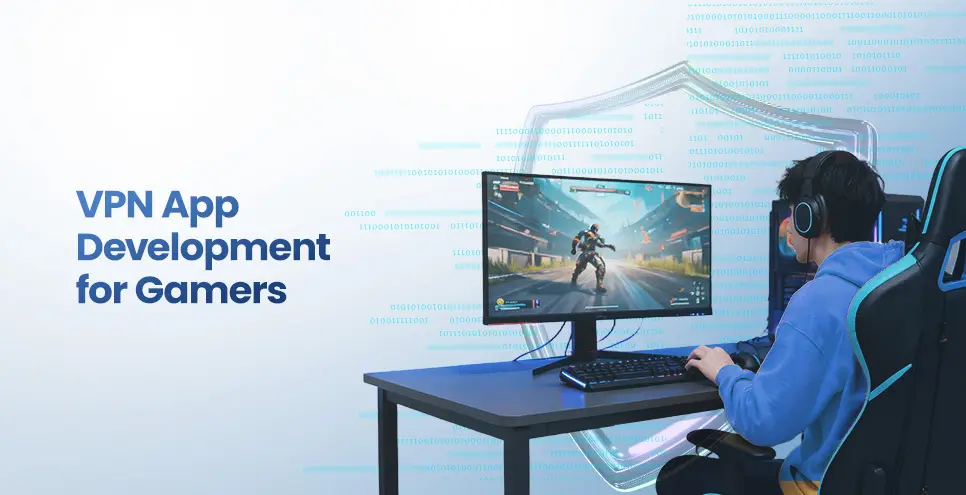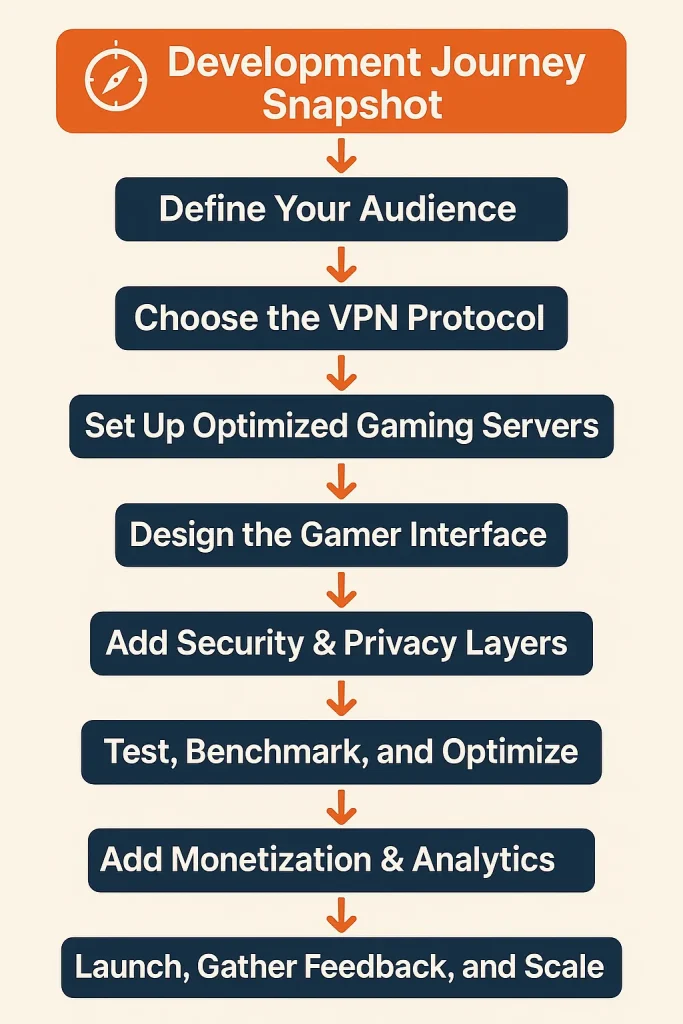
Lag is every gamer’s worst enemy. You’re milliseconds away from victory and then your screen freezes. The difference between winning and rage-quitting often comes down to one thing: connection quality.
That’s why VPN app development for gamers is quickly becoming the next big frontier in online performance. Modern gaming VPNs are about speed, stability, and unlocking servers that were once out of reach.
Imagine a VPN built just for gaming. It routes your traffic through the fastest servers. It cuts ping in half and keeps your connection steady. You can join tournaments or access servers from anywhere. This isn’t wishful thinking. Smart developers and studios are already building it.
Whether you’re a game publisher aiming to deliver smoother multiplayer experiences or a tech entrepreneur exploring low-latency VPN solutions, this guide breaks down exactly how to design, build, and optimize a gaming VPN that performs at pro levels.
By the end, you’ll know how to reduce ping for online gaming, access geo-restricted servers, and develop a VPN app that gives your users the edge every gamer craves.
Gaming today is global. Players from every corner of the world compete on the same servers. Speed, connection quality, and stability decide who wins — not just skill.
That’s why VPN app development for gamers is becoming a core part of online gaming infrastructure. A gaming VPN protects privacy and improves performance. It connects players to faster routes, keeps ping low, and ensures smooth matches.
The gaming industry is projected to reach $321 billion by 2026. Most of that growth comes from online multiplayer games and esports. Every second of lag costs engagement, and every disconnection hurts the player experience.
Developers, ISPs, and studios see this shift. They know what gamers want. A custom VPN app for gamers gives them speed, access, and a fair edge. These performance-focused VPNs are already changing how games are played, streamed, and shared.
A VPN app for gaming does more than hide your IP. It makes your connection faster and more stable.
When you play online, your data travels through your Internet Service Provider (ISP). Sometimes, that route is long and crowded. A VPN finds a shorter, cleaner path between you and the game server.
That’s why gamers use low-latency VPN solutions. They reduce ping and smooth out lag spikes. They also protect your connection from throttling when ISPs slow down traffic during peak hours.
A well-optimized gaming VPN app can:
For developers, these benefits show why VPN app development for gamers is so important. With smart routing, efficient protocols, and the right server setup, a VPN can turn frustrating gameplay into a seamless experience.
A VPN app for gamers helps fix some of the most common online gaming problems:
Each of these issues affects the player experience. That’s why VPN app development for gamers has become essential for developers, studios, and ISPs who want to deliver better performance and reliability.
A good VPN app for gamers must do more than protect privacy. It should boost speed, reduce ping, and keep the connection stable during every match.
Here are the key features that make a gaming VPN truly effective:
The best gaming VPN apps with these features gives players a faster, safer, and more reliable experience. For developers, adding these capabilities is what turns a regular VPN into a true low-latency VPN solution built for gamers.
Building a VPN app for gamers isn’t just about writing code. It’s about designing for speed, stability, and smooth performance. Every step matters — from choosing the protocol to testing for real-world latency.
Here’s how to do it right 👇
Step 1: Define Your Audience
Decide who you’re building for. Competitive gamers, streamers, or casual players all have different needs. This decision shapes everything — from features to server locations.
Step 2: Choose the Right VPN Protocol
Speed is the key to performance. Use modern protocols like WireGuard or IKEv2/IPSec. They connect faster, handle packet loss better, and maintain low latency during gameplay.
Step 3: Set Up Optimized Servers
A gaming VPN is only as good as its servers. Deploy them in key gaming hubs like Frankfurt, Singapore, Dallas, and Tokyo. Use cloud-based scaling and load balancing to handle traffic spikes.
Step 4: Design a Gamer-Friendly Interface
Keep it simple and fast. Players should connect with one tap. Add quick-connect options, live ping displays, and server shortcuts.
Step 5: Integrate Security and Privacy
Protection matters. Add DDoS shielding, AES-256 or ChaCha20 encryption, and a kill switch. Gamers shouldn’t lose speed or safety when switching servers.
Step 6: Test and Optimize
Test everything — speed retention, ping consistency, and device performance. Use tools like Speedtest.net and multiplayer benchmarks. A good low-latency VPN solution performs the same across regions.
Step 7: Add Monetization and Analytics
Decide how your app will grow. Offer subscriptions, freemium access, or custom packages for studios. Add analytics to track usage, performance, and conversion rates.
Here’s a quick visual summary of the gaming VPN app development process — from planning to launch.

The protocol you choose decides how your gaming VPN app performs. It controls speed, encryption, and stability.
Some protocols are built for strong security, others for speed. To build a low-latency VPN solution, you need both.
Here’s how the top options compare 👇
| Protocol | Latency Performance | Best Use Case | Encryption Type |
| WireGuard | Excellent | Fast routing for competitive gaming | ChaCha20 |
| IKEv2/IPSec | Great | Mobile and console gaming | AES-256 |
| OpenVPN (UDP) | Good | Cross-platform performance | AES-256 |
| SSTP / L2TP | Moderate | Legacy systems, limited regions | AES-128 |
WireGuard is the clear leader for gaming. It uses lightweight code and modern cryptography to cut handshake time and improve packet delivery. Tests show it can deliver up to 30% faster throughput than OpenVPN on the same hardware.
IKEv2/IPSec is a close second. It’s great for mobile devices because it reconnects quickly when networks change — perfect for gamers switching from Wi-Fi to mobile data.
OpenVPN (UDP) still works well for multi-platform support but requires more CPU resources. Older protocols like L2TP/IPSec or SSTP can still work, but they’re slower and not ideal for high-performance gaming.
If you’re building a VPN app for gamers, choose WireGuard as your default. Pair it with smart server routing and load balancing, and you’ll deliver near-native speeds even under heavy gameplay.
Reducing ping isn’t magic. It’s all about smart routing and server placement. For any gaming VPN app, proximity and performance go hand in hand. The closer your VPN server is to the player’s location, the shorter the data path becomes — and that means faster response times.
Deploying servers near major gaming hubs like Frankfurt, Singapore, Dallas, or Tokyo helps reduce travel distance and improve connection stability. Use load balancing to manage player traffic and prevent network congestion. You can also integrate auto-ping detection so users always connect to the fastest available route. Advanced setups even use AI-based route optimization and multi-hop routing to reroute data intelligently and maintain steady performance under heavy load.
With the right routing and infrastructure strategy, developers can deliver near-native performance and a gaming experience players actually enjoy.
Gamers expect speed, but they also value safety. A solid gaming VPN app should include:
These features ensure data security without compromising performance.
The rise of gaming VPN development isn’t just a trend — it’s a market shift.
Game studios, ISPs, and startups are now offering branded VPN solutions to:
With VPN app development for gamers, businesses can position themselves at the intersection of performance and privacy.
At Kolpolok Limited, we specialize in gaming VPN app development that delivers real performance. Our team builds low-latency VPN architectures optimized for esports, streaming, and competitive play.
From protocol integration to server deployment, we develop systems that reduce ping, boost reliability, and maintain speed under pressure. Our VPN developers ensure your product performs flawlessly across all devices.
Yes. A well-optimized VPN can shorten routing paths and lower ping by up to 30–40% depending on distance and server load.
WireGuard and IKEv2/IPSec are preferred for their speed and stability.
They route traffic through optimized servers near gaming data centers to reduce network hops.
Yes. With the right VPN development tools, APIs, and protocols, developers can create custom gaming VPNs for any platform.
Yes. Kolpolok Limited provides custom VPN app development for gamers, from protocol design to full-scale deployment.
The future of gaming is about more than visuals or power; it’s about connection. The best gaming VPN app gives players the speed, access, and freedom to compete anywhere without lag or limits.
For developers, ISPs, and studios, this is the time to lead the next phase of online gaming. Build smarter infrastructure. Choose faster protocols. Deliver the kind of performance gamers actually feel — and remember.
At Kolpolok Limited, we don’t just develop VPNs; we engineer low-latency gaming experiences.
If you’re ready to create a VPN app that performs at pro levels, our team can help you plan, build, and launch it — faster, smarter, and at a global scale.